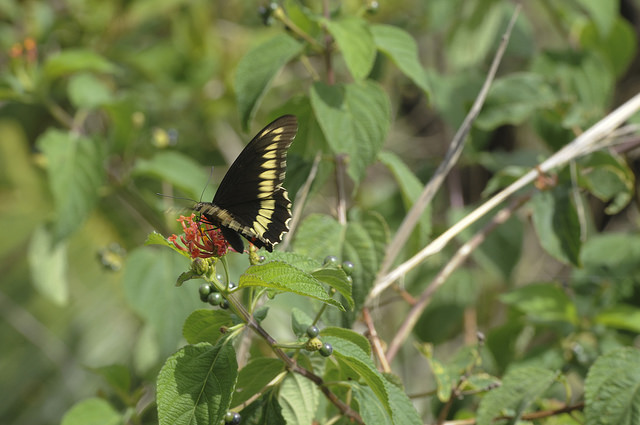Send to a friend
The details you provide on this page will not be used to send unsolicited email, and will not be sold to a 3rd party. See privacy policy.
[SÃO PAULO] A legal requirement put in place by the Brazilian government within the framework of a biodiversity law is likely to reduce research on the country’s biological diversity, scientists have warned.
As of November last year, the country made it mandatory for local and international researchers and institutions whose work involves Brazilian biodiversity to register all their activities with the National System of Genetic Resource Management and Associated Traditional Knowledge (SisGen).
The deadline to meet this rule, which aims to prevent biopiracy, is 5 November this year. And in a letter published in Science, a group of 16 Brazilian scientists now sound the alarm about how the move will impact biodiversity research.
“[The law] will decimate scientific research on Brazilian biodiversity by requiring scientists to divert an inordinate amount of resources from research to the time-consuming process of registering every specimen, DNA sequence, photograph, and any other observation of Brazilian biodiversity before publication, presentation at scientific meetings, or dissemination to media outlets”, they argue.
“I cannot see any positive elements of this law at all,” William Laurance, a biologist who lived in Brazil for five years while working at the National Institute for Research in the Amazon, told SciDev.Net.
Laurance, who currently works at James Cook University in Australia, added: “[It] might greatly complicate research in Brazil, dissuade international researchers from wanting to work there, and broadly impede progress on researches of any sort.”
In the letter the group says that failure to comply, which includes the unregistered dissemination of scientific results — even if they are based on public databases or previously published data — could result in heavy fines.
“This law might greatly complicate research in Brazil, dissuade international researchers from wanting to work there, and broadly impede progress on researches of any sort”
William Laurance
They warn the new rules could lead to the collapse of the national biodiversity research, mainly in areas such as taxonomy and biological systematics. The two fields are crucial for understanding and conserving biodiversity because they involve the description, identification, mapping, classification, and study of evolutionary interrelationships of living beings.
“To do so, these studies need to sample large numbers of species frequently distributed across several countries or continents, requiring routine shipment and receipt of material between institutions based across the globe,” explains Flávio Bockmann, a biologist at the University of Sao Paulo’s Biology Department, and one of the letter’s authors.
Bockmann is the lead researcher on a fish biodiversity project supported by São Paulo’s research foundation FAPESP, and his work may be jeopardised by the new rules.
Ongoing debate
The Biodiversity Law came into force in November 2015, aiming to inhibit biopiracy and regulate research and development of products that are based on genetic resources derived from Brazilian biodiversity. It stems from concerns about access to these resources and the equitable distribution of benefits from them.
Brazil was a pioneer in making this move, drawing the attention of other countries interested in knowing its content, the former minister of the environment Izabella Teixeira highlighted at that time through a media statement.
One of the main features of the law is that gaining access to biological material can only occur through electronic registration of the researcher or company involved. When it came into force, researchers argued it would create a huge bureaucratic hurdle for researchers doing basic research that does not involve possible commercial exploitation.Years of pressure prompted the government to exempt several areas of basic research – but it has now reversed its position in November 2017, prompting the latest protests.
A letter sent on February 23 to the Brazilian Society for the Advancement of Science (SBPC), which is helping the government implement the new rule, has been signed by more than 1,200 researchers and several science societies, highlighting the potential implications of the changes that were about happen.
It points out that many international institutions are refusing to accept applications from Brazilian researchers because of concerns that the bureaucracy would compromise progress, for example when transporting biological materials for analysis.
In an email a statement , the Ministry of the Environment has argued that the Biodiversity Law has been encouraging research, technological development and innovation in the country.
Mercedes Bustamante, a biologist at University of Brasília’s Biological Science Institute, who is linked to managing the new national registration system, told SciDev.Net it is crucial that the scientific community participates in implementing the legal framework so that it achieves its objectives without compromising research.
Bustamante represents the SBPC in the Genetic Heritage Management Council (CGen), a department linked to the Ministry of the Environment which is responsible for managing SisGen.
She says participation is essential for developing a biodiversity-based economy and contributing to conservation, adding that it will be crucial to harmonise the gradual implementation of the legal framework with the pace of progress in scientific research.
She explains that based on the concerns raised by the scientific community, the CGen is drawing up plans to preserve research collaborations that involve the transfer of biological material between Brazilian and international institutions.
One of these is to establish a simplified register for research taxonomy and biological systematics, according to Bustamante. This would allow information already registered in other systems to be applied when registering the same research. These plans will ultimately need to be approved by the Brazilian government.
The project carried out by Flávio Blockmann is supported by FAPESP, a SciDev.Net donor.














